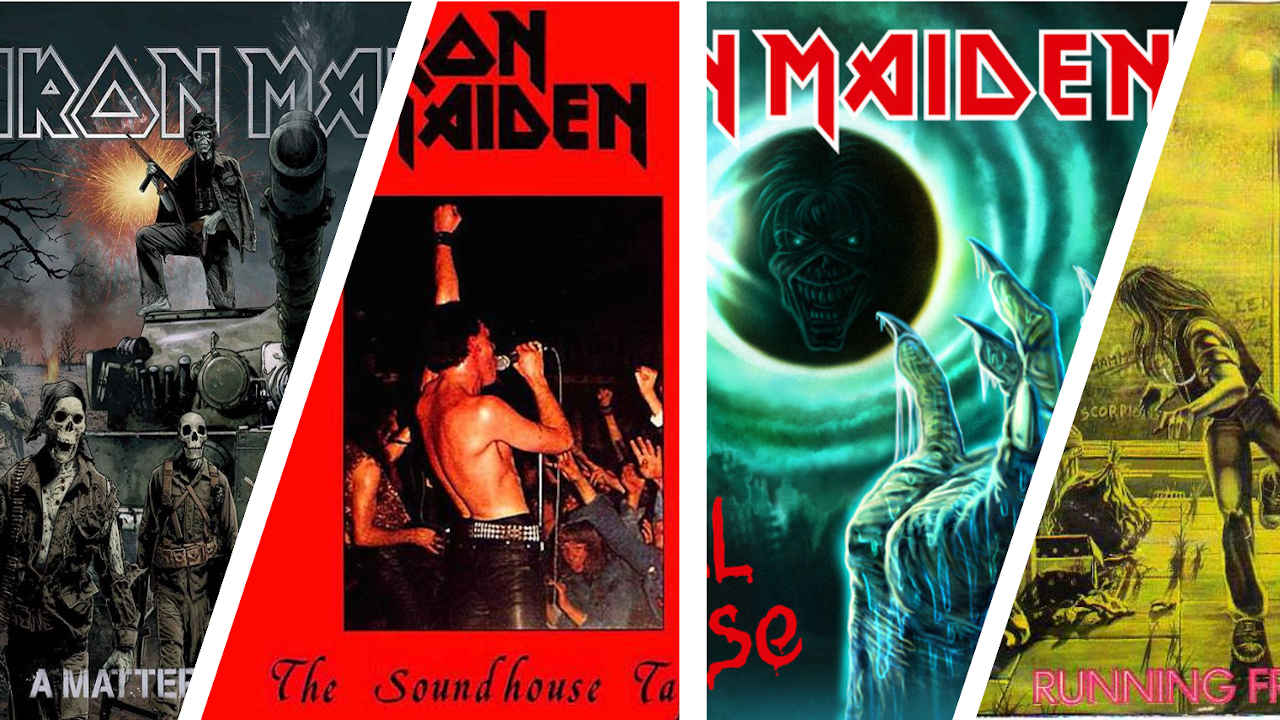The 20 most underrated Iron Maiden songs
Everyone knows the anthems – but these are the songs that Maiden connoisseurs know rule

Iron Maiden didn’t write the Great Heavy Metal Songbook, but they’ve contributed plenty of chapters. From early classics such as Running Free, Phantom Of The Opera and the immortal one-two of Run To The Hills and The Number Of The Beast, through such imperious 80s and early 90s anthems as Can I Play With Madness?, Rime Of The Ancient Mariner and Fear Of The Dark to such latterday epics as Blood Brothers, For The Greater Good Of God and If Eternity Should Fail, their songs are some of the pillars on which metal is built. But as with band that has put out as much music as they have. there are bound to be a whole bunch of songs that been overlooked, underrated or plain forgotten about. Here are 20 of those delights that lie hidden in the deepest, darkest crevices of their back catalogue. Join us for a journey into the underbelly of the beast.

Invasion (1980)
Remember the days when Maiden were seen as a metal-punk hybrid? Recorded with a slight boogie flavour on their NWOBHM-instigating The Soundhouse Tapes EP and then heavied-up as the flipside of their third single, Women In Uniform, this spiky-topped two-and-a-half minute paean to the raping and pillaging exploits of the Vikings reminds us why. Paul Di’Anno sneers brilliantly and the instrumental backing is red hot; right in your face.
Burning Ambition (Running Free single B-side, 1980)
Considering the extravagance and musical development that would follow in later years, the B-side of their debut single Running Free shows Maiden and their Di’Anno-fronted days in a more simplistic light. Yet its innocence is charming, the delicate guitar melody at its epicentre a throwback to bassist and bandleader Steve Harris’ well-documented admiration for Wishbone Ash.
Strange World (Iron Maiden, 1980)
It’s easy to forget just how off-piste Maiden could veer in their early days. Appearing on their self-titled debut album, Strange World is the closest they ever came to writing a psychedelic song, complete with limpid guitars, interstellar ambience and Paul Di’Anno singing something about “travelling through outer space”. Their equivalent of Black Sabbath’s Planet Caravan.
Total Eclipse (1982 single B-side)
Even Steve Harris has admitted he dropped a clanger by leaving this magnificently apocalyptic mini-epic off The Number Of The Beast in favour of the clunky Gangland, instead relegating it to the B-side of the Run To The Hills single. It’s been on and off NOTB reissues in recent years, but it still remains a curio to all but the most diehard Maiden fan.
Still Life (Piece Of Mind, 1983)
Piece Of Mind is the greatest Iron Maiden album no one talks about as much as they should – bizarre because it features at least five cast-iron classics. Six if we count Still Life. Tucked away near the start of the old side two, it’s a slice of melodic Maiden brilliance that starts with Nicko McBrain gooning about with backwards masking and ends with Bruce being dragged under the waters of a mysterious pool by supernatural forces. Nightmares, indeed!
Sun And Steel (Piece Of Mind, 1983)
The Flight Of Icarus and The Trooper hog the attention when it comes to Piece Of Mind, and yet in a parallel universe this rollocking, slickly despatched anthem, inspired by the 17th century Japanese swordsman and rōnin Miyamoto Musashi, could easily have been a sizeable hit single.
Sign up below to get the latest from Classic Rock, plus exclusive special offers, direct to your inbox!
Back In The Village (Powerslave, 1984)
If an album as gargantuan as Powerslave has an overlooked gem, then it’s this. A semi-sequel to The Prisoner, it drops in plenty of references from that series without actually making a whole lot of sense. Still, what it lacks in lyrical cohesion, it makes up for in pure energy. Even Steve Harris isn’t sure if Maiden have played this one live or not.
Flash Of The Blade (Powerslave, 1984)
Another unsung Powerslave highlight, and another song about sword-fighting - the perfect subject matter for Bruce Dickinson, a keen enthusiast of the sport, who begins this distant cousin of Sun And Steel by singing of ‘chasing dragons’ as small boy armed with a weapon made from wood and heads into a rather more life-threatening scenario. The triumphant musical backing is well suited to its theme: ‘One man, and his honour.’
Sea Of Madness (Somewhere In Time, 1986)
Maiden may be bigging up Somewhere In Time on their current tour, but they’re pointedly ignoring one of that album’s killer songs. Sea Of Madness bustles and buzzes before giving way to a soaring chorus and that killer breakdown where everything falls away then kicks in again.
Only The Good Die Young (1988)
In one of the more perverse decisions of their career, not only did Maiden choose to close the Seventh Son Of A Seventh Son album with this rampantly commercial tune, they didn’t even bother to release it as a single. Where much of Seventh Son is epic and complex, Only The Good Die Young is more direct: stirring, soaring and in possession of a hell of a chorus. This stands shoulder to shoulder with their best-known songs.
Fates Warning (No Prayer For The Dying, 1990)
No Prayer For The Dying is the weakest Dickinson-era Maiden album, but it still has a handful of gems buried amid some of the more pedestrian material. This is one – a classic Maiden galloper that packs a blockbusting chorus and wicked solo into just three and a half minutes, as Bruce ruminates on pre-destination and just how much choice we really have in life (spoiler: not much).
Wasting Love (Fear Of The Dark, 1992)
Iron Maiden don’t do ballads, but they came close here. Bruce Dickinson’s eye may have been wandering towards the exit door, but he gives it his all on this emotional, slow-burning dissection of empty sexual encounters and the loneliness that can come with them. They released it as a single and hammered it on the Fear Of The Dark tour but it seems to have been unfairly kicked into the long grass since.
Judgement Of Heaven (The X-Factor, 1995)
The Blaze Bayley era produced some belters – The Clansman, Futureal, Sign Of The Cross, Man On The Edge. And then there’s Judgement Of Heaven, a comparatively breezy respite from the murk and angst of The X-Factor that, for some reason, always gets overlooked even by the staunchest Blaze defender.
Como Estais Amigos (Virtual XI, 1997)
Blaze Bayley is rightly proud of the last track on his second and final Iron Maiden album. A touching tribute to the lives lost on both sides in the 1982 Falklands War, it captures the grandeur of old school Maiden. Bafflingly, the band themselves never played it live, though it’s frequently the centrepiece of Blaze’s solo sets.
The Thin Line Between Love And Hate (2000)
Actions needed to speak louder than words when Bruce Dickinson and Adrian Smith returned to Iron Maiden. The result was one of their most consistently strong releases – Brave New World. Lord alone knows why this stellar song was tucked away at the end, unless the band knew it would leave the listener reeling, reaching again for the button marked ‘play’.
Age Of Innocence (Dance Of Death, 2003)
Dance Of Death is back-loaded with a bunch of songs that never get their due credit, partly due to the fact that the first half of the album is so epic. This is one of them. The exasperated, ‘criminals get it easy’ lyric might be jarring to some, but it’s great to hear Bruce really chowing down on that massive chorus.
Journeyman (Dance Of Death, 2003)
An Iron Maiden album closer like no other – a stirring acoustic mini-epic festooned with sweeping strings and a hoist-your-glasses-high feel that piles on the emotion in a way that Maiden songs rarely do. In another universe, it‘s the closing-credits music to some massive Hollywood blockbuster.
The Longest Day (A Matter Of Life And Death, 2006)
Maiden’s poignant tribute to those thousands that lost their lives during the Normandy Landings of D-Day, 6 June 1944, channels the cloying fear of the combatants (‘Oh, the water is red/With the blood of the dead/But I’m still alive, pray to God I survive’) via a soundtrack that builds into something appropriately explosive.
The Alchemist (The Final Fronter, 2011)
Amid the mystical epics that pack out The Final Frontier, The Alchemist is breath of fresh air - a four-and-a-half minute blast of almost punky energy that wouldn’t have sounded out of place on one of their classic 80s albums. A reminder that Maiden are never better than when they keep it tight.
The Book Of Souls (The Book Of Souls, 2016)
In many ways it’s slightly unfair that Bruce’s 18-minute epic Empire Of The Clouds has become so established as the main talking point of The Book Of Souls album. The only-slightly-less-epic title track is textbook latterday Maiden, from a scene-setting intro to the intricate webs spun by those Three Amigos, Gers, Dave Murray and Adrian Smith.

Dave Ling was a co-founder of Classic Rock magazine. His words have appeared in a variety of music publications, including RAW, Kerrang!, Metal Hammer, Prog, Rock Candy, Fireworks and Sounds. Dave’s life was shaped in 1974 through the purchase of a copy of Sweet’s album ‘Sweet Fanny Adams’, along with early gig experiences from Status Quo, Rush, Iron Maiden, AC/DC, Yes and Queen. As a lifelong season ticket holder of Crystal Palace FC, he is completely incapable of uttering the word ‘Br***ton’.
